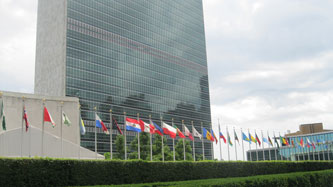 .
. 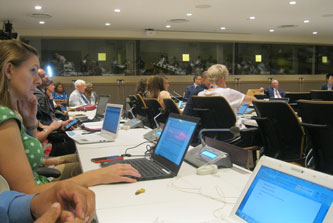
United Nations; morning briefing for major groups and stakeholders
On 10-14 July, I travelled to New York to participate in the United Nations High Level Political Forum (HLPF) on Sustainable Development, where the International Environment Forum (IEF) organized some activities as its 22nd Annual Conference (see full report of those activities on the IEF web site). I started with the morning briefing for major groups and stakeholders (MGoS). Then there was a breakfast meeting at the Baha'i International Community (BIC) United Nations Office just across the street from the United Nations, where I met all the Baha'is involved in the HLPF, including a group of young people from around the world participating in a Youth Series at HLPF organized by BIC. Apart from the IEF events, I also attended events organized by the Science and Technology Major Group to which the IEF belongs, as well as others on sustainable consumption and production, some of which are described below.
 .
. 
United Nations; morning briefing for major groups and stakeholders
The IEF events were planned primarily to allow participation at a distance, to avoid the cost and environmental impact of many members travelling to New York, so only a few members were actually there. The Partnership for Education and Research About Responsible Living (PERL), in which IEF is an active participant, organized an Education for Sustainable Lifestyles Workshop as a side event at Scandinavia House on 12 July called "Responsibility Roulette". IEF Governing Board member Victoria Thoresen planned this to help participants to learn how sustainable lifestyles can become more desirable, accessible and normal.
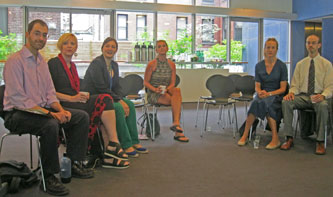 .
. 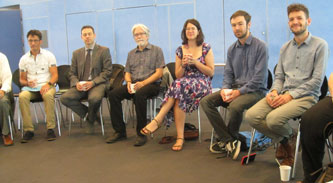 .
. 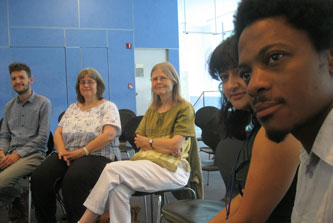
Left: Erik Assadourian, Dorothy Marcic, Vanessa Timmer, Andrea
Hvistendahl and other participants in the workshop including Christine
Muller (right: centre)
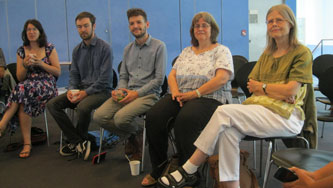 .
. 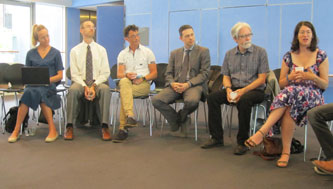 .
. 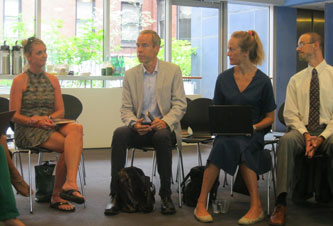
All workshop participants contributed to the discussion
The workshop was organized as an interactive game in which everyone participated including the panel of invited international experts. Three roulette wheels determined which participant would speak, what issue would be addressed, and how it would relate to one of the SDGs, to demonstrate that they were all integrated and interrelated. The game allowed the whole group to explore what a happier, healthier and more sustainable lifestyle is, and who has what responsibility for making sustainable lifestyles the norm and not the exception.
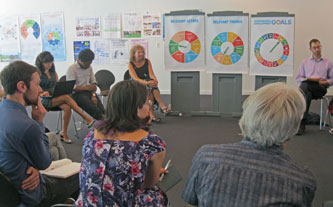 .
. 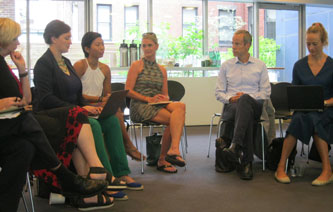 .
. 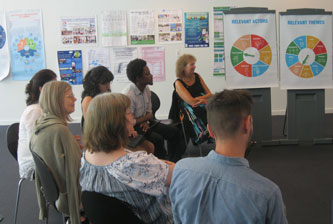
Interactive game with three roulette wheels
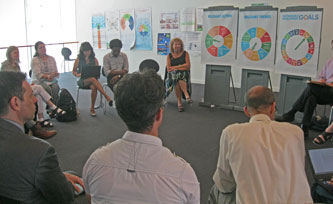 .
. 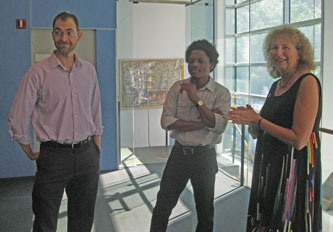 .
. 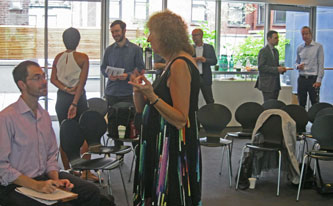
The interactive game; Erik Assadourian, Lewis Akenji and Victoria
Thoresen; a pause for discussion
In addition to Victoria and myself, other invited experts were Lewis
Akenji from the Institute for Global Environmental Strategies (IGES) in
Japan, whom I have known for 20 years and who was my student in
Environmental Diplomacy; Erik Assadourian of the Worldwatch Institute in
Washington, D.C.; Dorothy Marcic, a professor of business, author and
playwright of popular off-Broadway shows, another old friend and Baha'i;
and Vanessa Timmer, Executive Director of One Earth,
Vancouver, Canada. Artist Andrea Hvistendahl of Stockholm presented
student artworks expressing sustainability and sustainable lifestyles, and
there was an exhibition of education for sustainable lifestyle initiatives
from around the world. IEF board member Christine Muller, with whom I work
closely on Wilmette Institute courses on climate change and
sustainability, was one of the participants.
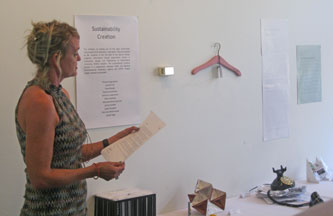 .
. 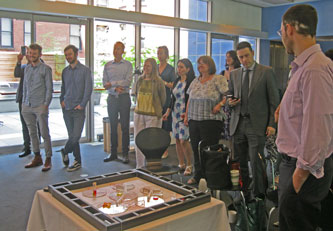 .
. 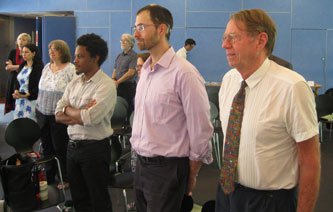
Artist Andrea Hvistendahl explaining the art works on
sustainability for participants; Lewis, Erik and me watching the
demonstration
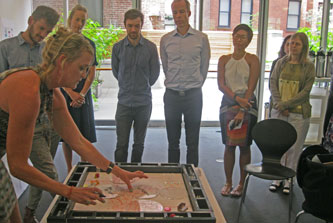 .
. 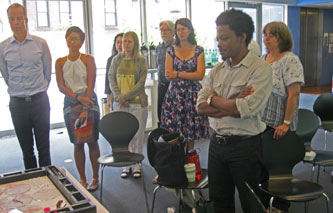 .
. 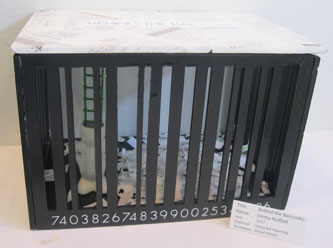
Demonstration of a sustainability game; one artwork was a barcode
prison
To save HLPF participants from the effort of finding a meeting room to hear a panel of experts on the themes of the 2018 HLPF, the International Environment Forum invited its experts to record their short presentations on YouTube, as an "IEF Panel on Your Smartphone" so that HLPF participants could watch them whenever and wherever convenient on their smartphone or tablet. Seven short video presentations were prepared including two of my own. They covered transformation towards sustainable societies, water challenges in rural Tanzania (SDG6), better education for renewable energy (SDG7), responsible consumption and production, reducing excessive consumption (SDG12), sustainable forestry in DRC, and biodiversity and sustainable development (SDG15). These were publicized on the Internet distribution lists for Major Groups and Stakeholders at the HLPF, and can be viewed from the IEF web site. There were over 200 views just the first week.
The Baha'i International Community held three youth series events. I attended one on Thursday at the newly renovated BIC Offices on "Youth Transformation towards Peaceful and Resilient Societies" with a representative of the UN and case studies by youth from the Netherlands, Afghanistan and Colombia.
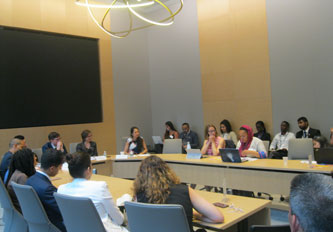 .
. 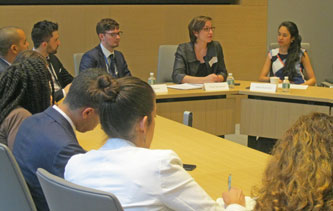 .
. 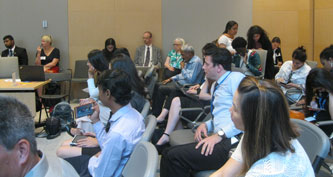
BIC Youth Series; panel from Colombia, Afghanistan, Netherlands and
UN with BIC moderator; audience
On Friday, I attended another event at Scandinavia House organized by the Stockholm Environment Institute (SEI) and the Institute for Global Environmental Strategies (IGES) on "Our Lifestyles in 2030: the Futures We Want". There were many of the same participants as in our PERL workshop the day before, including facilitator Vanessa Timmer, and Lewis Akenji gave one of the keynotes. Patricia Vilchis Tella of SEI, who was one of the main organizers, was a participant in the 2016 IEF Conference in Santa Cruz, Bolivia.
The meeting opened with welcomes from Kajsa Olofsgard, Sweden's Ambassador for the 2030 Agenda, the President of IGES, and the Swedish Minister of Consumer Affairs (by video). The Sustainable Lifestyles and Education (SLE) Programme was then described by its co-directors, Peter Repinski of SEI and Lewis Akenji of IGES (http://www.oneplanetnetwork.org/sustainable-lifestyles-and-education).
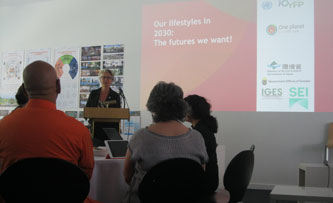 .
. 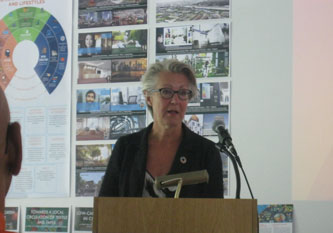 .
. 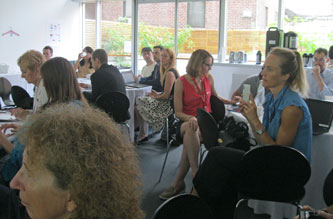
Amb. Kajsa Olofsgard opening the event; audience
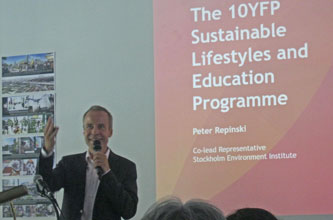 .
. 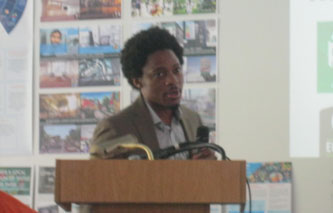 .
. 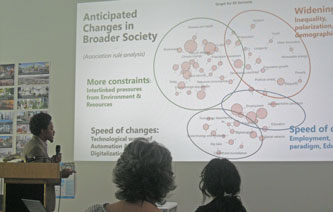
Peter Repinski of SEI; Lewis Akenji of IGES
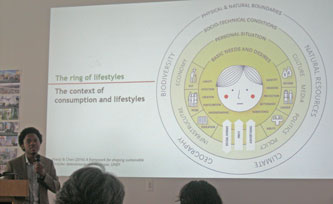 .
. 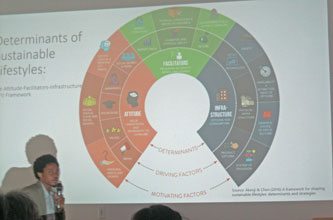 .
. 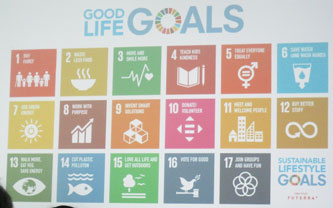
Lewis Akenji presenting visions and framing of lifestyles in 2030;
Futerra's GoodLife Goals
There were short presentations on the Generation 2030 project with youth under the Nordic Council of Ministers, graphic ways to make the SDGs accessible to the general public, the work of UN Environment on sustainable lifestyles and plastic pollution, and EU certification of ecolabels. Case studies were also presented on MUNI networking in the Philippines, an ecovillage in Ireland, a social enterprise for energy access in South Africa, and IKEA as a responsible company. Group exercises explored future visions, and the roles of government and business.
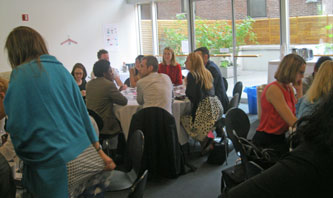 .
. 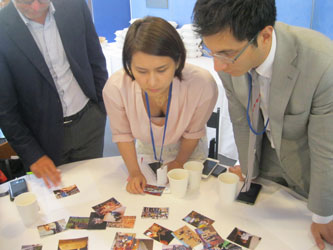 .
. 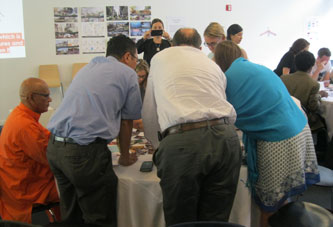
Group exercises exploring futures visions and roles for government
and business
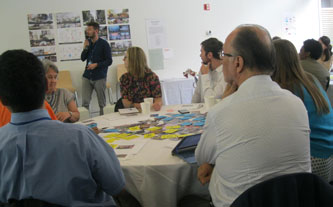
Case studies
In the evening, I contributed to the discussion at a side event by the
Nordic Council of Ministers on "Generation 2030 - The Nordic Region
accepting the challenges of SDG 12" on achieving sustainable
consumption and production. After an opening by Kajsa Olofsgard, Sweden's
Ambassador for the 2030 Agenda, the event launched the Nordic SDG12
Report, which shows that achieving sustainable consumption and production
is the most challenging of all the SDGs for the Nordic countries with
their high standard of living, waste and chemical pollution, and large
footprint through their imports on other parts of the world.
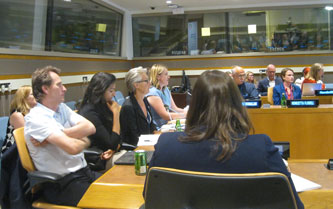 .
. 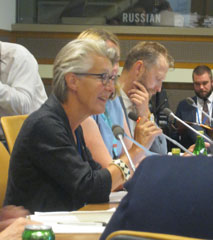 .
. 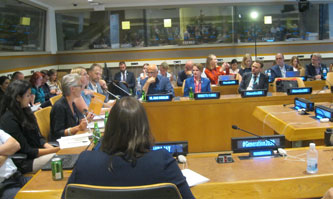
Generation 2030 panel; Amb. Kajsa Olofsgard; participants
The keynote speaker was Sweden's youth delegate Henrietta Flodell, who highlighted the difficulties faced by youth today with positive trends that do not reflect the reality of youth unable to find employment, suffering from increasing inequality, lacking vision or possibilities for action in the world, and excluded from spaces with political power. One symptom is the epidemic of mental illness among youth in Nordic countries.
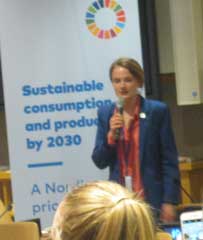 .
. 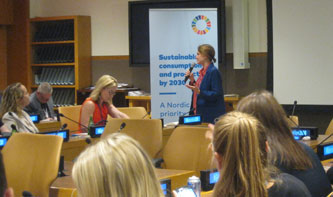 .
. 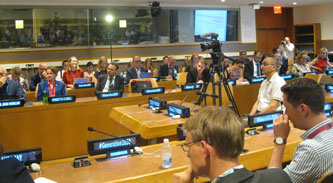
Keynote by Sweden's youth delegate Henrietta Flodell; part of
audience
A panel of experts identified some of the most important challenges as building a circular economy, leveraging the power of sustainable public procurement, integrating policies across domains, and accepting the need for a transition.
The discussion highlighted the neglect of social values, the need for a positive alternative to the consumer society which was leaving the youth behind, and the importance of education.
Return to travel 2018 page - Return to personal home page
Last updated 15 July 2018
Photographs copyright © Arthur Lyon Dahl 2018